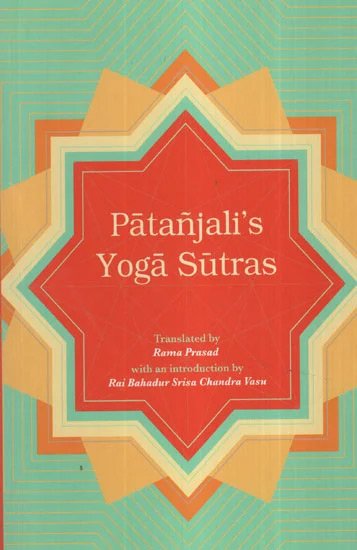Yoga-sutras (with Vyasa and Vachaspati Mishra)
by Rama Prasada | 1924 | 154,800 words | ISBN-10: 9381406863 | ISBN-13: 9789381406861
The Yoga-Sutra 4.34, English translation with Commentaries. The Yoga Sutras are an ancient collection of Sanskrit texts dating from 500 BCE dealing with Yoga and Meditation in four books. It deals with topics such as Samadhi (meditative absorption), Sadhana (Yoga practice), Vibhuti (powers or Siddhis), Kaivaly (isolation) and Moksha (liberation).
Sūtra 4.34
Sanskrit text, Unicode transliteration and English translation of Sūtra 4.34:
पुरुषार्थशून्यानां गुणानां प्रतिप्रसवः कैवल्यं स्वरूपप्रतिष्ठा वा चितिशक्तिर् इति ॥ ४.३४ ॥
puruṣārthaśūnyānāṃ guṇānāṃ pratiprasavaḥ kaivalyaṃ svarūpapratiṣṭhā vā citiśaktir iti || 4.34 ||
puruṣārtha-śūnyānām—of those that are devoid of the object of the Puruṣa. guṇānām—of the qualities, pratiprasavaḥ—becoming latent, kaivalyam—absolute freedom. svarūpa-pratiṣṭhā—established in its own nature, vā—or. citi-śāktiḥ—the power of consciousness. iti—so, thus.
34. Absolute freedom comes when the qualities, becoming devoid of the object of the Puruṣa, become latent; or the power of consciousness becomes established in its own nature.—194.
The Sankhya-pravachana commentary of Vyasa
[English translation of the 7th century commentary by Vyāsa called the Sāṅkhya-pravacana, Vyāsabhāṣya or Yogabhāṣya]
[Sanskrit text for commentary available]
It has been said that absolute freedom comes when the succession of the functioning of the qualities in the performance of their duties is over. Its nature is now ascertained. Absolute freedom is the latency of the qualities on becoming devoid of the object of the Puruṣa, or it is the power of consciousness established in its own nature. Absolute freedom is the becoming latent by inverse process, of the qualities, when they are devoid of the object of the Puruṣa, after having achieved the experience and emancipation of the soul.
The power of consciousness is absolute when it is not again limited.—194.
Thus ends the Commentary of Vyāsa, the Sāṅkhya-pravacana, the Fourth Chapter on Absolute Freedom.
The Book is Finished.
The Gloss of Vachaspati Mishra
[English translation of the 9th century Tattvavaiśāradī by Vācaspatimiśra]
Describes the connection of the aphorism defining the nature of absolute freedom (kaivalya) with the previous aphorism:—‘It has been said, &c.’ Absolute freedom is the becoming latent of the qualities when they become devoid of the objects of the Puruṣa.’
The becoming latent of the qualities in their cause, the Pradhāna, when they are devoid of the objects of the Puruṣa, having achieved them:—The out-going and the trance and the inhibitive potencies of the qualities which appear both as the causes and the effectṣ, become latent in the mind. The mind becomes latent in the principle of egoism. The principle of egoism becomes latent in the undifferentiated phenomenal, and the undifferentiative phenomenal into the noumenal.
This backward disappearance of the qualities which appear as both the causes and the effects, is called absolute freedom of the Puruṣa, in relation to the Pradhāna from which he is released. Or, freedom is the establishment of the Puruṣa in his own nature. Says this, ‘Or, it is the power, &c.’ Inasmuch as in the Mahāpralaya, too, the power of consciousness is established in its own nature, but that is not Mokṣa, he says:—‘Does not come into relationship again, &c.’ The word ‘ITI’ in the aphorism means the end of the book.
In this Chapter have been described the mind fit for freedom, and the trance known as the Cloud of Virtue, for establishing the Puruṣa, as he appears in the other world; also two descriptions of Mukti have been described and other things also by context.
The root of the afflictions has been described, as also the afflictions; both the Yogas are described together with the eight accessories. The way of Mokṣa in the shape of the knowledge of the distinction between the Puruṣa and the qualities has been rendered plainer. Absolute freedom has been ascertained to be the power of consciousness free from the afflictions.
Thus ends the Fourth Chapter of Absolute Freedom in the Gloss of Vācaspati Miśra on the Commentary of Vyāsa.—34.
OM TAT SAT.
For the service of Brahma.
